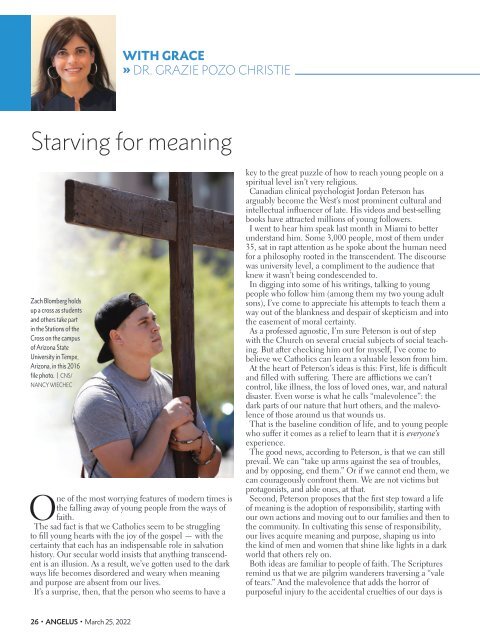Angelus News | March 25, 2022 | Vol. 7 No. 6
On the cover: A man walks by the debris of buildings destroyed during Russian aerial bombing in the village of Byshiv outside Kyiv, Ukraine, on March 12. On Page 10, Ann Rodgers hears from Catholics in the U.S. and on the ground in Ukraine working around the clock to rescue families in harm’s way. On Page 14, an Italian missionary family spoke exclusively to Pablo Kay, Angelus editor-in-chief, about their dramatic escape from a besieged city and why they still believe they have a mission in Ukraine.
On the cover: A man walks by the debris of buildings destroyed during Russian aerial bombing in the village of Byshiv outside Kyiv, Ukraine, on March 12. On Page 10, Ann Rodgers hears from Catholics in the U.S. and on the ground in Ukraine working around the clock to rescue families in harm’s way. On Page 14, an Italian missionary family spoke exclusively to Pablo Kay, Angelus editor-in-chief, about their dramatic escape from a besieged city and why they still believe they have a mission in Ukraine.
You also want an ePaper? Increase the reach of your titles
YUMPU automatically turns print PDFs into web optimized ePapers that Google loves.
WITH GRACE<br />
DR. GRAZIE POZO CHRISTIE<br />
Starving for meaning<br />
Zach Blomberg holds<br />
up a cross as students<br />
and others take part<br />
in the Stations of the<br />
Cross on the campus<br />
of Arizona State<br />
University in Tempe,<br />
Arizona, in this 2016<br />
file photo. | CNS/<br />
NANCY WIECHEC<br />
One of the most worrying features of modern times is<br />
the falling away of young people from the ways of<br />
faith.<br />
The sad fact is that we Catholics seem to be struggling<br />
to fill young hearts with the joy of the gospel — with the<br />
certainty that each has an indispensable role in salvation<br />
history. Our secular world insists that anything transcendent<br />
is an illusion. As a result, we’ve gotten used to the dark<br />
ways life becomes disordered and weary when meaning<br />
and purpose are absent from our lives.<br />
It’s a surprise, then, that the person who seems to have a<br />
key to the great puzzle of how to reach young people on a<br />
spiritual level isn’t very religious.<br />
Canadian clinical psychologist Jordan Peterson has<br />
arguably become the West’s most prominent cultural and<br />
intellectual influencer of late. His videos and best-selling<br />
books have attracted millions of young followers.<br />
I went to hear him speak last month in Miami to better<br />
understand him. Some 3,000 people, most of them under<br />
35, sat in rapt attention as he spoke about the human need<br />
for a philosophy rooted in the transcendent. The discourse<br />
was university level, a compliment to the audience that<br />
knew it wasn’t being condescended to.<br />
In digging into some of his writings, talking to young<br />
people who follow him (among them my two young adult<br />
sons), I’ve come to appreciate his attempts to teach them a<br />
way out of the blankness and despair of skepticism and into<br />
the easement of moral certainty.<br />
As a professed agnostic, I’m sure Peterson is out of step<br />
with the Church on several crucial subjects of social teaching.<br />
But after checking him out for myself, I’ve come to<br />
believe we Catholics can learn a valuable lesson from him.<br />
At the heart of Peterson’s ideas is this: First, life is difficult<br />
and filled with suffering. There are afflictions we can’t<br />
control, like illness, the loss of loved ones, war, and natural<br />
disaster. Even worse is what he calls “malevolence”: the<br />
dark parts of our nature that hurt others, and the malevolence<br />
of those around us that wounds us.<br />
That is the baseline condition of life, and to young people<br />
who suffer it comes as a relief to learn that it is everyone’s<br />
experience.<br />
The good news, according to Peterson, is that we can still<br />
prevail. We can “take up arms against the sea of troubles,<br />
and by opposing, end them.” Or if we cannot end them, we<br />
can courageously confront them. We are not victims but<br />
protagonists, and able ones, at that.<br />
Second, Peterson proposes that the first step toward a life<br />
of meaning is the adoption of responsibility, starting with<br />
our own actions and moving out to our families and then to<br />
the community. In cultivating this sense of responsibility,<br />
our lives acquire meaning and purpose, shaping us into<br />
the kind of men and women that shine like lights in a dark<br />
world that others rely on.<br />
Both ideas are familiar to people of faith. The Scriptures<br />
remind us that we are pilgrim wanderers traversing a “vale<br />
of tears.” And the malevolence that adds the horror of<br />
purposeful injury to the accidental cruelties of our days is<br />
26 • ANGELUS • <strong>March</strong> <strong>25</strong>, <strong>2022</strong>


















